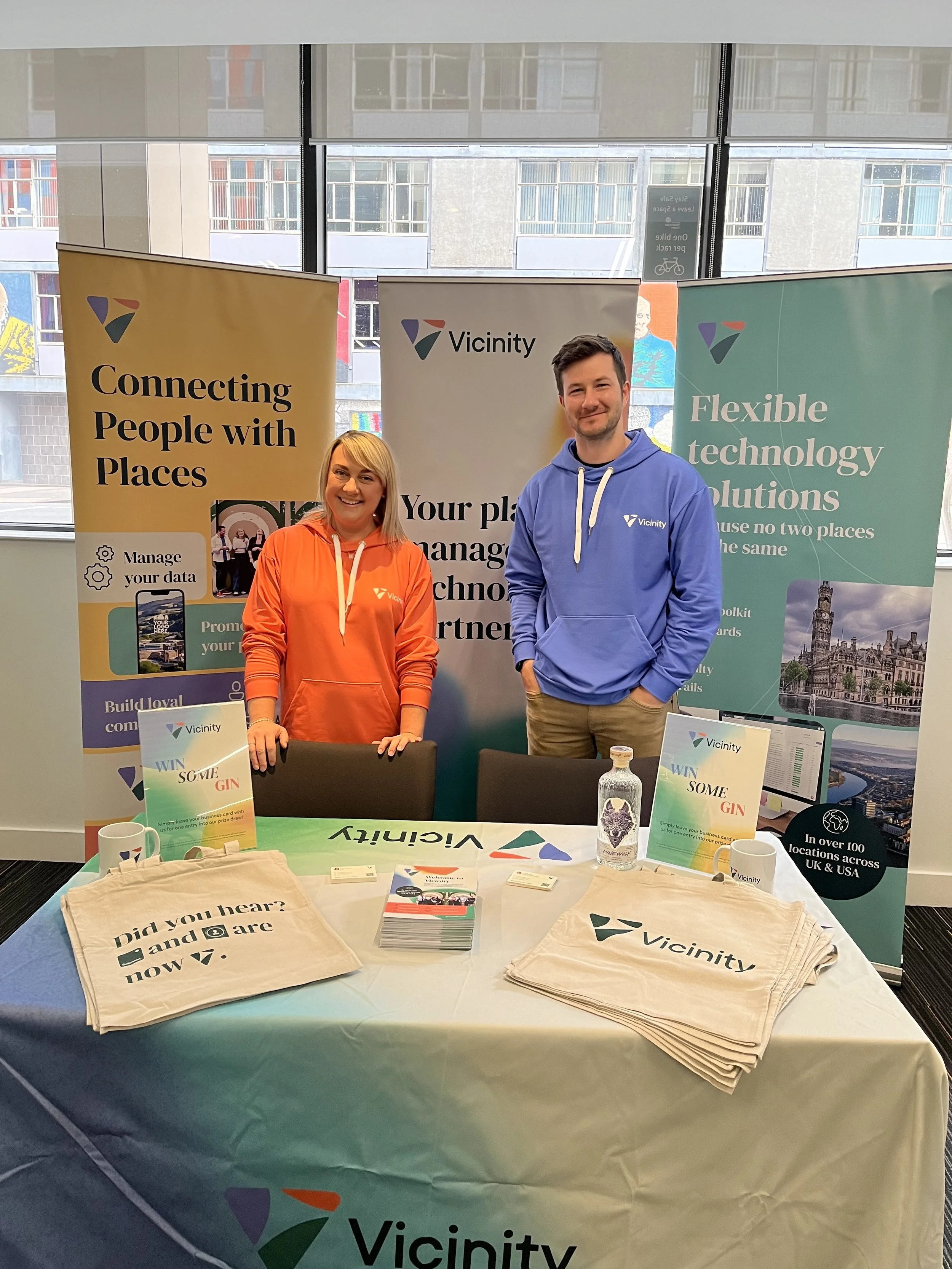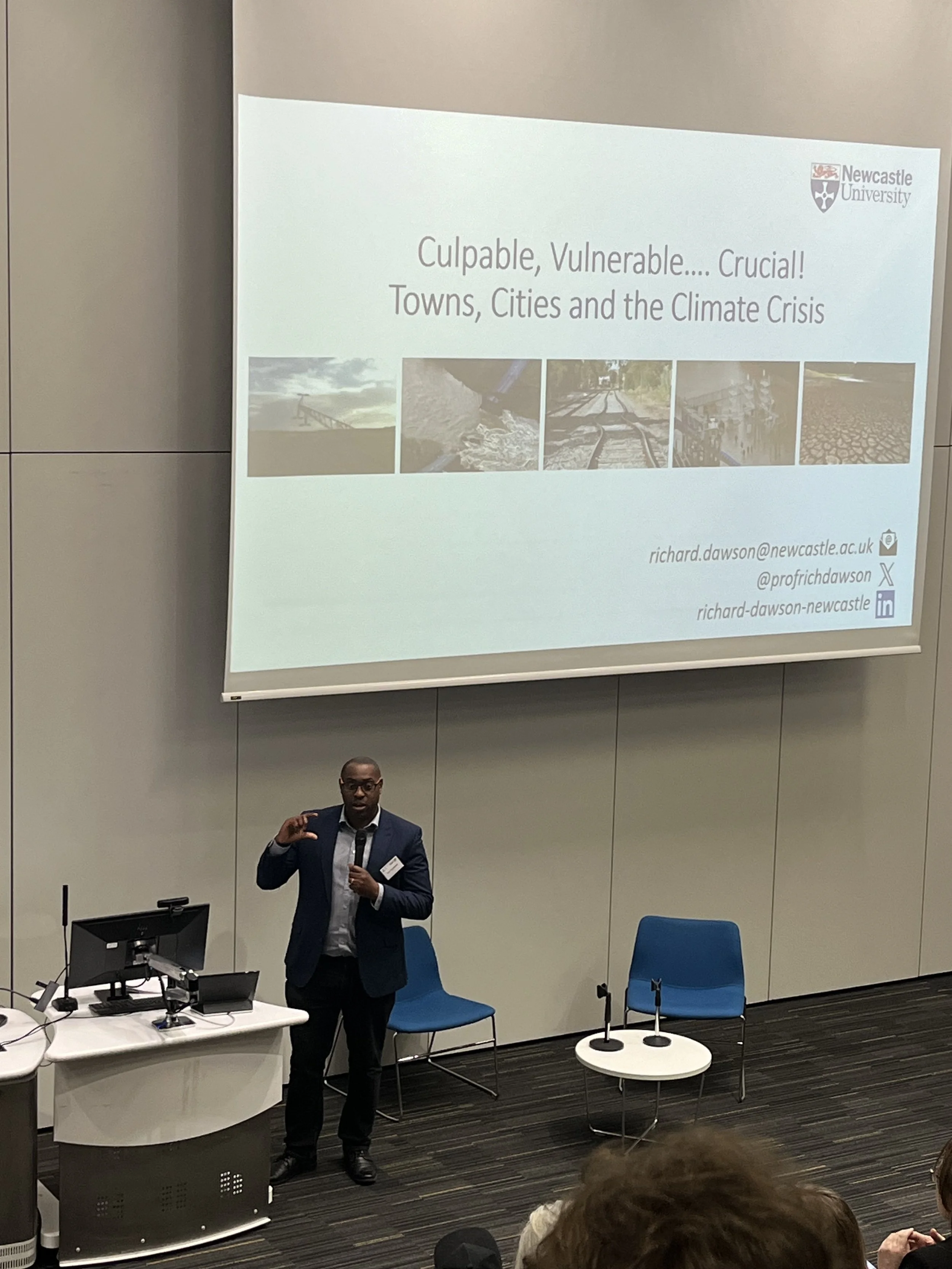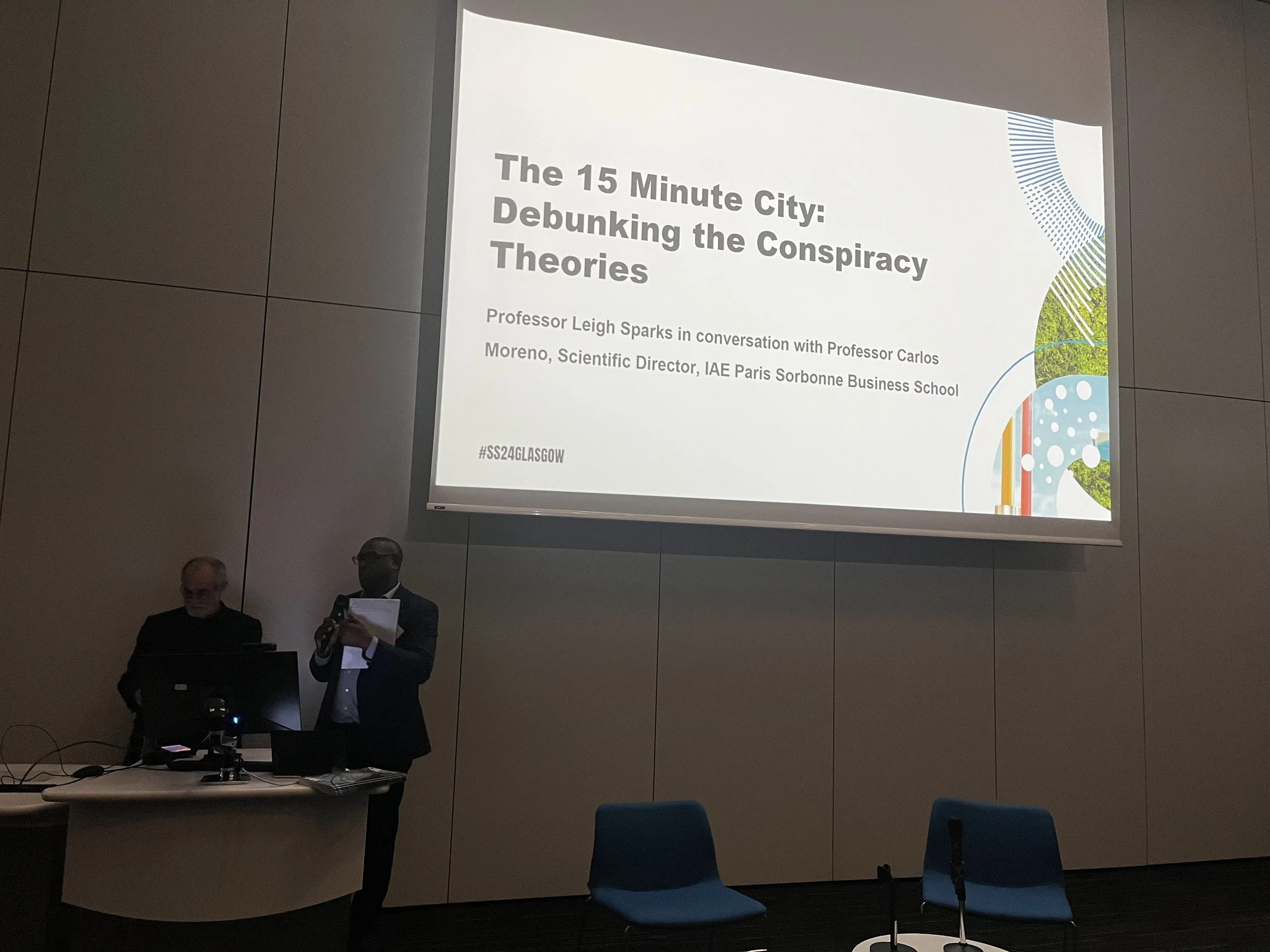ATCM Summer School 2024
This was a event focused on the big challenge of climate change, and how it effects our urban centres. As an audience of place-makers, town managers and BID managers the issues and solutions often seemed so much bigger than our capacity, but the effects on us are very real; flooded streets, destroyed businesses and vacant centres.
With the UK only responsible for 2% of global emissions, we will not be the battleground where the ‘war on climate change’ is won, but we can be a hotbed for innovation and own our response to our own emissions.
Here I have tried to summarise the talks from the first day of Summer School. I hope I have not been too reductionist in my summaries, but capture the salient themes and conclusions. For more information I’d encourage you to reach out to the speakers directly.
Henry Jinman and Lisa Machin on the exhibition stand at the ATCM Summer School 2024.
10am: The Politics of Climate Action: Welcome to Summer School 2024
Speaker: Ojay McDonald, CEO, ATC
Key Points:
Theme: Tension between politics and climate change.
Political Dynamics: Noted conflicts between SNP and Greens in Scotland and local responses to Trump's election in the US.
Local Action: Highlighted the role of local governments in climate solutions. We don’t need to wait for the central government action.
Culpability and vulnerability: Ojay challenged us to think what we are doing about it in our area, as it is something that affects us all and in on every agenda. He emphasised the need for innovation in urban climate action.
Importance: Set the stage for the conference by framing climate action within political and local contexts, stressing the need for innovation and proactive local governance.
10.15am: Culpable, Vulnerable: Towns, Cities, and the Climate Crisis
Speaker: Professor Richard Dawson, Director of Research, School of Engineering at Newcastle University
Key Points:
Local Challenges: US mayors have more authority than UK counterparts, but potential exists.
Resource and Data: Massive amounts of data (recommend getting the slides for this one). He recommends https://uk-cri.org for summary data on headline trends in changes in climate, and https://naei.energysecurity.gov.uk/laghgapp/ for local GHG emission data.
Risks and Solutions:
Urban areas vulnerable to climate effects like flooding and heatwaves.
UK domestic GHG reduction (2005-2021): 33.1% compared to transport: 6.5%.
Solutions include shared mobility, timber skyscrapers, and nature-based urban spaces.
Importance: Provided crucial data and highlighted the urgency and scope of urban climate risks, offering some niche and practical solutions.
10.40am: End Game: Is Flooding a High Street Investment Killer?
Speaker: Alastair Ross FCIPR, Head of Public Policy (Scotland, Wales and Northern Ireland), The Association of British Insurers
Key Points:
Flood Impact: Cited examples of recent floods and their economic toll. £155m of weather related insurance claims for damaged businesses were made in 2023. Most of this caused by storms Babet, Ciaran and Debi, which also cost £352m of damage to homes.
Insurance Challenges: EY study showed for every £1 insurers received in premium they paid out £1.22 in claims. Rising insurance claims may lead to higher premium areas or even completely uninsurable areas as the risk of flooding moves from ‘possible’ to ‘probable’.
Resilience Measures: There is more of a focus on ‘property resistance and resilience’ examples include raising your power sockets and fixtures and fittings, air brick covers and flood gates. 38% of businesses have flood insurance but only 18% implement resilience measures.
Importance: Highlighted the economic impact of flooding on businesses and the critical need for improved resilience measures in order to maintain insurance cover.
11.25am: Demolition vs Retrofit: Is the M&S Case a Tipping Point in Regeneration?
Speaker: Henrietta Billings, Director, SAVE British Heritage
Key Points:
Heritage Conservation: Advocated for repurposing buildings over demolition.
Case Study: M&S building debate on sustainability vs. demolition.
Landmark Decision: Michael Gove's decision to prevent demolition based on sustainability, though contested in court and now the decision will rest with Gove’s successor.
Importance: Henrietta made a very strong case for retrofitting existing buildings including quicker planning processes, popoularity, cost, short life of newer materials and overall environmental impact. She emphasised the growing significance of sustainability in urban planning and heritage conservation, marking a potential shift in policy and public sentiment.
Carlos Moreno and Ojay McDonald at the ATCM Summer Shool 2024
11.50am: The 15 Minute City: Debunking the Conspiracy Theories
Speakers: Professor Carlos Moreno subsequently joined by Professor Leigh Sparks.
Carlos Moreno, the academic responsible for the 15-minute city idea, presented his vision for a more loving and healthy city.
Key Points:
Concept: Promotes accessibility to essential services, work and lifestyle facilities within 15 minutes to enhance quality of life. Citing Utrecht bicycle traffic as a problem he said: why do you have to bike across the city, if you could get everything you need within 10 minutes?
Social Equity: Addresses spatial and social injustices in urban areas.
Implementation: Advocated for public rather than private control to avoid gentrification.
Importance: Reinforced the benefits of localised urban planning for social equity and sustainable living, countering misconceptions about the concept.
Buy his book ‘The 15-Minute City: A Solution to Saving Our Time and Our Planet’ here
Carlos urges you to join the Global Proximities Observatory created by the Sorbonne University.
1.30pm: Net Zero x Resilience – What a Climate Ready Town Looks Like
Speaker: Alan Hendry, Sustainability Director, Mott MacDonald
Alan and his colleague focused on Glasgow’s Net Zero route map to reach net zero by 2023.
Key Points:
Glasgow’s Strategy: Focus on resilience and sustainable urban infrastructure. .
Tools and Projects: A collaboration with Climate View from Sweden provides a set of tools to help you understand what levers you can pull to change outcomes. Various green infrastructure projects were cited including the removal of peak train fares, to alter travel habits and a series of projects to introduce green spaces, rain gardens, urban drainage, and reclaim public space alongside the river Clyde.
Importance: Offered a practical example of how a city can achieve net zero through comprehensive planning and innovative projects.
2pm: Together to Zero
Speaker: Rhea Marsden, Head of Connections, Hemiko
Key Points:
Heat Networks: A heat network collects waste heat around towns and distribute it to a community via a network of underground pipes so that they can heat their homes and buildings. They are a low carbon and cost effective alternative to gas boilers.
Large-scale investment in heat networks is a sustainable heating solution. Hemiko have £1bn to spend and are already working with many towns and cities across the UK. Sources of locally wasted heat include waste water treatment plants, industrial manufacturers and data centres.
Case Studies: Worthing and Greenwich Peninsula projects creating jobs and reducing carbon footprint.
Importance: Showcased the potential of heat networks to significantly reduce urban carbon emissions and stimulate local economies.
2.20pm: Glasgow’s Journey to Net Zero
Speaker: Councillor Susan Aitken, Leader, Glasgow City Council
Key Points:
Collective Action: Emphasised the importance of collective efforts in urban climate action. She claimed cities will create the ‘biggest wins’ in terms of climate action but that it must be achieved in an equitable way.
Equity and Resilience: Stressed the need for climate strategies to prioritise equity and resilience.
Importance: Reinforced the role of cities in leading climate action and the importance of inclusive and resilient strategies.
Conference Room 2: From Climate Improvement Districts to Positive Energy Districts
Chair: Dr. Julie Grail, Founder and Managing Director, The BIDs Business
Speakers:
Richard Guiney, CEO, DublinTown: Highlighted the role of BIDs in sustainable energy and flood resilience. Richard claimed BIDs do not have long enough terms, and do not have enough stakeholder buy-in to effectively manage climate action, but are great vehicles for business engagement, can pool energy and advocate for smaller businesses. Thus introducing the concept of longer servicing Positive Energy Districts.
Rozina Spinnoy, Founder Director, BIDs Belgium: Discussed holistic and collaborative approaches in BIDs. The level of bureaucracy in Belgium appears stifling, with 8 levels of government and 16 mayors in Brussels alone.
Anelise Rosa, Head, City Finance Programme, C40 Cities: Highlighted challenges and strategies for implementing climate projects in mega-cities including frequent political change, and the need for decentralisation and fiscal autonomy.
Importance: This session provided insights into how Business Improvement Districts could provide a route to Positive Energy Districts and therefore drive sustainable urban development and climate resilience through collaboration and long-term planning.




